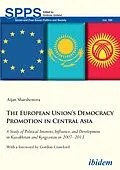Brussels made democracy, human rights, the rule of law, and good governance its top co-operation priorities in the EU Strategy Framework towards Central Asia for 2007-2013. This book examines two interrelated questions: To what extent has EU democracy promotion in Central Asia been successful? And, to the extent that it was successful, why was it so? The book presents a comprehensive analytical framework for the evaluation of democracy promotion, including factors which may facilitate or hinder democratic development in Central Asia. It demonstrates the validity of a holistic approach to analyzing impediments of democracy promotion meaning that external pro-democratic support is affected by a variety of diverse factors whose impact can vary as international, regional, and domestic conditions change. The stable and rich authoritarian state of Kazakhstan is different from the much poorer Kyrgyzstan-a state prone to political instability, but also to democratic openings. By contrasting the success of democracy promotion in these two countries which have different strategic importance for the EU, this study provides valuable insights into how non-normative interests interfere with normatively driven policies.
Autorentext
The author:Dr. Aijan Sharshenova studied political science and international relations at the Centre International de Formation Européenne and the Institut für Europäische Politik at Berlin, and University of Leeds, UK. She has worked for the Middle East and North Africa Office of the International Peace Institute at Manama, Kingdom of Bahrain, as well as in democracy and development assistance projects in Kyrgyzstan.The author of the foreword:Dr. Gordon Crawford is a Research Professor of Global Development at the Centre for Trust, Peace and Social Relations at Coventry University, UK.
Klappentext
The EU made the areas of democracy, human rights, rule of law, and good governance a top cooperation priority of the EU Strategy framework towards Central Asia for 2007-2013. The inclusion of strong normative elements into this strategy was both due to the EU's commitment to democratic principles and the lack of a sufficient democratization progress in Central Asia. This book examines two interrelated questions: To what extent has EU democracy promotion in Central Asia been successful? And, to the extent that it was successful, why was this so?
By answering these questions, this timely investigation adds to the existing research on democracy promotion mechanisms. It presents a comprehensive analytical framework for the evaluation of democracy promotion, including factors which may facilitate or impede democracy promotion in Central Asia. It also demonstrates the validity of a holistic approach when analyzing factors impeding democracy promotion. It acknowledges that external democracy promotion is affected by a variety of diverse factors whose impact can vary as international, regional, and domestic conditions change. Aijan Sharshenova undertakes two original case studies into the stable and rich authoritarian Kazakhstan as well as much poorer Kyrgyzstan-a state prone to political instability but also to democratic openings. By contrasting the success of democracy promotion in two countries with different strategic importance for the EU, she provides valuable insights into how non-normative interests interfere with normatively driven policies.
